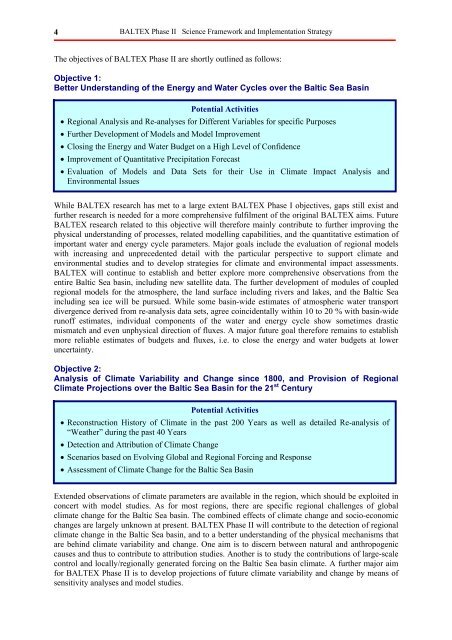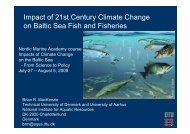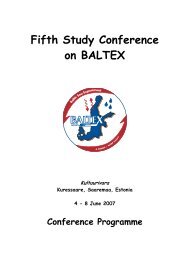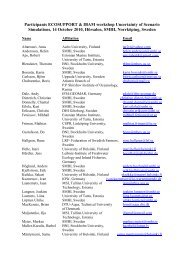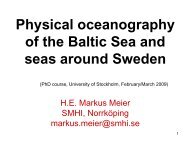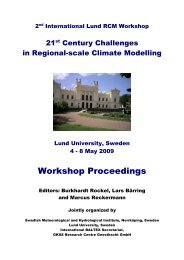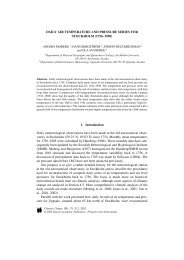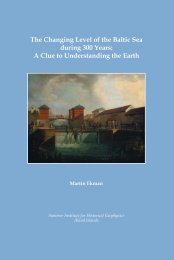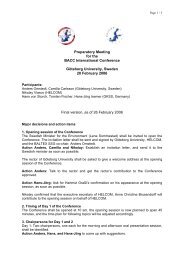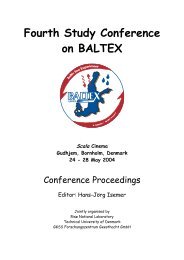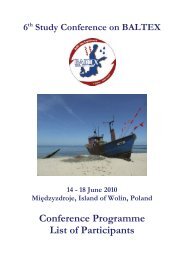BALTEX Phase II 2003 â 2012. Science Framework and ...
BALTEX Phase II 2003 â 2012. Science Framework and ...
BALTEX Phase II 2003 â 2012. Science Framework and ...
You also want an ePaper? Increase the reach of your titles
YUMPU automatically turns print PDFs into web optimized ePapers that Google loves.
4<br />
<strong>BALTEX</strong> <strong>Phase</strong> <strong>II</strong> <strong>Science</strong> <strong>Framework</strong> <strong>and</strong> Implementation Strategy<br />
The objectives of <strong>BALTEX</strong> <strong>Phase</strong> <strong>II</strong> are shortly outlined as follows:<br />
Objective 1:<br />
Better Underst<strong>and</strong>ing of the Energy <strong>and</strong> Water Cycles over the Baltic Sea Basin<br />
Potential Activities<br />
• Regional Analysis <strong>and</strong> Re-analyses for Different Variables for specific Purposes<br />
• Further Development of Models <strong>and</strong> Model Improvement<br />
• Closing the Energy <strong>and</strong> Water Budget on a High Level of Confidence<br />
• Improvement of Quantitative Precipitation Forecast<br />
• Evaluation of Models <strong>and</strong> Data Sets for their Use in Climate Impact Analysis <strong>and</strong><br />
Environmental Issues<br />
While <strong>BALTEX</strong> research has met to a large extent <strong>BALTEX</strong> <strong>Phase</strong> I objectives, gaps still exist <strong>and</strong><br />
further research is needed for a more comprehensive fulfilment of the original <strong>BALTEX</strong> aims. Future<br />
<strong>BALTEX</strong> research related to this objective will therefore mainly contribute to further improving the<br />
physical underst<strong>and</strong>ing of processes, related modelling capabilities, <strong>and</strong> the quantitative estimation of<br />
important water <strong>and</strong> energy cycle parameters. Major goals include the evaluation of regional models<br />
with increasing <strong>and</strong> unprecedented detail with the particular perspective to support climate <strong>and</strong><br />
environmental studies <strong>and</strong> to develop strategies for climate <strong>and</strong> environmental impact assessments.<br />
<strong>BALTEX</strong> will continue to establish <strong>and</strong> better explore more comprehensive observations from the<br />
entire Baltic Sea basin, including new satellite data. The further development of modules of coupled<br />
regional models for the atmosphere, the l<strong>and</strong> surface including rivers <strong>and</strong> lakes, <strong>and</strong> the Baltic Sea<br />
including sea ice will be pursued. While some basin-wide estimates of atmospheric water transport<br />
divergence derived from re-analysis data sets, agree coincidentally within 10 to 20 % with basin-wide<br />
runoff estimates, individual components of the water <strong>and</strong> energy cycle show sometimes drastic<br />
mismatch <strong>and</strong> even unphysical direction of fluxes. A major future goal therefore remains to establish<br />
more reliable estimates of budgets <strong>and</strong> fluxes, i.e. to close the energy <strong>and</strong> water budgets at lower<br />
uncertainty.<br />
Objective 2:<br />
Analysis of Climate Variability <strong>and</strong> Change since 1800, <strong>and</strong> Provision of Regional<br />
Climate Projections over the Baltic Sea Basin for the 21 st Century<br />
Potential Activities<br />
• Reconstruction History of Climate in the past 200 Years as well as detailed Re-analysis of<br />
“Weather” during the past 40 Years<br />
• Detection <strong>and</strong> Attribution of Climate Change<br />
• Scenarios based on Evolving Global <strong>and</strong> Regional Forcing <strong>and</strong> Response<br />
• Assessment of Climate Change for the Baltic Sea Basin<br />
Extended observations of climate parameters are available in the region, which should be exploited in<br />
concert with model studies. As for most regions, there are specific regional challenges of global<br />
climate change for the Baltic Sea basin. The combined effects of climate change <strong>and</strong> socio-economic<br />
changes are largely unknown at present. <strong>BALTEX</strong> <strong>Phase</strong> <strong>II</strong> will contribute to the detection of regional<br />
climate change in the Baltic Sea basin, <strong>and</strong> to a better underst<strong>and</strong>ing of the physical mechanisms that<br />
are behind climate variability <strong>and</strong> change. One aim is to discern between natural <strong>and</strong> anthropogenic<br />
causes <strong>and</strong> thus to contribute to attribution studies. Another is to study the contributions of large-scale<br />
control <strong>and</strong> locally/regionally generated forcing on the Baltic Sea basin climate. A further major aim<br />
for <strong>BALTEX</strong> <strong>Phase</strong> <strong>II</strong> is to develop projections of future climate variability <strong>and</strong> change by means of<br />
sensitivity analyses <strong>and</strong> model studies.


